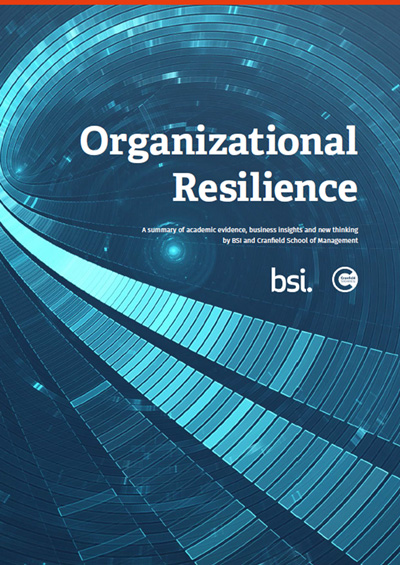A new global study by BSI (British Standards Institution) and Cranfield School of Management, finds that business leaders are struggling to balance risk with opportunity, threatening the long-term survival of their firms. The report, “Organizational Resilience: A summary of academic evidence, business insights and new thinking”, assesses half a century’s accepted wisdom on best-practice management, identifying an acute need for firms to embrace risk if they are to survive and thrive.
According to the study conflicting management advice has left senior executives reluctant to intervene, with the subsequent organizational paralysis leading firms to potentially sleepwalk into disaster. The report consolidates half a century of management thinking and over 180 academic papers into a single coherent approach. BSI commissioned the report in the wake of finding that less than one third of CEOs are confident in leading their firms to long term success.
David Denyer, Professor of Leadership and Organisational Change at Cranfield and author of the study comments: “Great businesses are built by leaders prepared to take the bad with the good. They recognize the tension between consistent defensive behaviours that stop bad things happening, and progressive, flexible ideas that allow the good to prosper. Put simply, senior leaders must manage the tensions between control, action, performance and innovation if organizations are to be truly resilient – and this requires paradoxical thinking.”
Howard Kerr, Global CEO of BSI, adds: “Today’s volatile business environment creates strategic tensions to which the appropriate response is rarely clear. Top executives interviewed for our report recognise that preparing for the unexpected is essential for long-term success. The Organizational Resilience Tension Quadrant identified in this report, provides leaders with clear guidance on how to take measured risks to unlock success.”
The study by Professor Denyer highlights the benefits of pairing agile thinking with robust systems. Successful firms do not look to achieve “zero risk”, but rather experience “zero trauma” from business setbacks, adapting to ensure future success.
Organizational Resilience has risen in prominence since it was first documented in guidance from BSI in 2014. Today’s study sets out a clear framework for adopting good practice across a business. Effective leadership is essential for implementation according to the report, with executives urged to manage the tension between defence and progression, consistency and flexibility.
Howard Kerr went onto say: “A resilient organization is one that doesn’t merely survive over the long term, but flourishes. We believe that mastering Organizational Resilience offers the best opportunity for companies to pass the test of time, unlocking future prosperity and longevity. Those that learn to spring forward and not stagger backwards, reap dividends for their company, employees, investors, government and society in general.”
BSI commissioned Cranfield School of Management to assess almost half a century’s management thinking, from 1970 to the present day, on how organizations can become resilient. Over 600 academic papers were initially screened, of which 181 were considered worthy of deeper analysis, together with a wealth of additional books and reports.
The report describes how thinking on Organizational Resilience has evolved over time, and identifies two core drivers for achieving it: Defensive – stopping bad things happening, Progressive – making good things happen.
Three new concepts are described in the report The Five Phases of Organizational Resilience, The Tension Quadrant, and the 4Sight Model.
Cranfield School of Management celebrates its 50th anniversary this year and will be hosting a wide range of exciting events and activities throughout 2017 to celebrate.
About Cranfield University
Cranfield has been a world leader in management education and research for over 50 years, helping individuals and organisations learn and succeed by transforming knowledge into action. We are dedicated to creating responsible management thinking, improving business performance and inspiring the next generation of business leaders. We work to change the lives of our students and executives by encouraging innovation and creative thinking, as well as the drive to succeed and make a real impact on their organisations.
Organisations as diverse as Jaguar Land Rover, BAE Systems, Royal Dutch Shell, L’Oréal, UNICEF and the African Development Bank have benefited from our work, which ranges from management research projects, through staff talent management development on our MBA courses, to customised executive programmes.
Cranfield is one of an elite group of Schools worldwide to hold the triple accreditation of: AACSB International (the Association to Advance Collegiate Schools of Business), EQUIS (European Quality Improvement System) and AMBA (the Association of MBAs).
We are in the Top 10 International Business Schools in the Forbes’ ranking.
Our open and customised executive education programmes are ranked in the top five in the UK, according to the latest Financial Times survey, and in the top ten in the world for international reach. Over 10,000 people come to Cranfield each year to benefit from our executive and professional development programmes.


